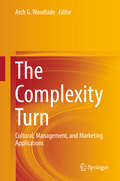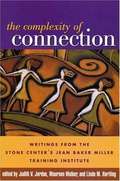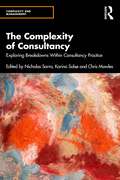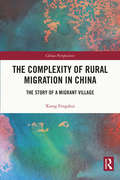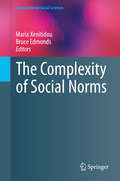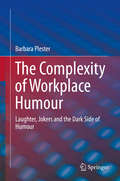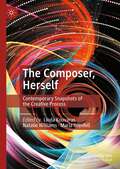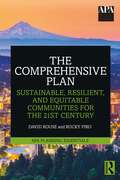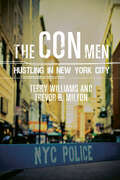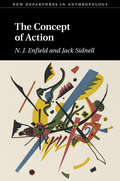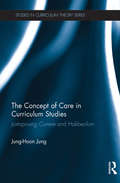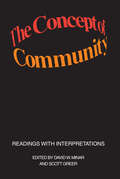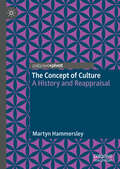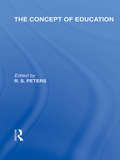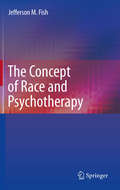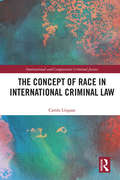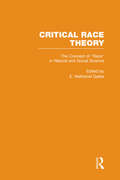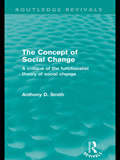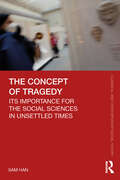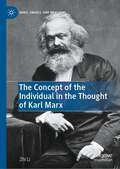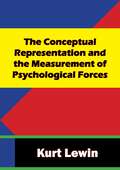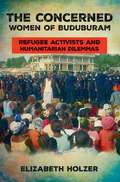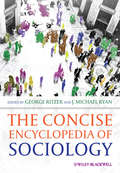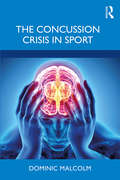- Table View
- List View
The Complexity Turn: Cultural, Management, and Marketing Applications
by Arch G. WoodsideThis book takes the reader beyond net effects and main and interaction effects thinking and methods. Complexity theory includes the tenet that recipes are more important than ingredients—any one antecedent (X) condition is insufficient for a consistent outcome (Y) (e.g., success or failure) even though the presence of certain antecedents may be necessary. A second tenet: modeling contrarian cases is useful because a high or low score for any given antecedent condition (X) associates with a high Y, low Y, and is irrelevant for high/low Y in some recipes in the same data set. Third tenet: equifinality happens—several recipes indicate high/low outcomes.
The Complexity of Connection: Writings from the Stone Center's Jean Baker Miller Training Institute
by Judith V. Jordan Maureen Walker Linda M. HardingThe volume presents an absorbing and practical examination of connection and disconnection at both individual and societal levels. Chapters explore how experiences of race, ethnicity, sexual orientation, class, and gender influence relationships, and how people can connect across difference and disagreement.
The Complexity of Consultancy: Exploring Breakdowns Within Consultancy Practice (Complexity and Management)
by Chris Mowles Nicholas Sarra Karina SolsøConsultancy is a lucrative industry dependent on the production and use of tools and techniques which hold out the promise of success for the organisations it supports: transformation, or greater efficiency and effectiveness, perhaps even culture change. However, a critical and important question is whether these promises are fulfilled in everyday practice in organisations. Is it possible at all for consultants to predict and control the changes that their clients ask for? This volume reframes the role of consultants from detached observers wielding a stable body of knowledge useful in all contexts, to that of skilled participants in the conscious and unconscious processes of organisational life. In this book, one of three in a series looking at complexity and management, the expert authors bring together their experiences to provide vibrant accounts of how to lead in everyday organisational situations using practical judgement. The book includes a brief historical introduction to complexity and leadership, real-world narratives illustrating concrete dilemmas in the workplace, and a concluding chapter that draws together the practical and theoretical implications. With both theoretical grounding and practical insights from managers and consultants in leading firms, this is an ideal resource for executives and students on leadership development and talent management programmes, as well as those undertaking higher education courses in leadership and consulting.
The Complexity of Rural Migration in China: The Story of a Migrant Village (China Perspectives)
by Xiong FengshuiThis book examines socio-economic relationships and cultural changes in contemporary rural China, focusing on the experience of a typical Chinese village the working-age population of which has been hollowed out by outbound labor migration. The volume sheds light on the inherent complexity of peasants’ material, economic, and emotional dependency on the countryside, and how these relationships shape their experience of migration and the personal transformation that comes with it. Simplistic binaries such as “traditional” and “modern” are left to one side in favour of a multifaceted approach to understanding the interactions among people, institutions, and the natural environment. The book will appeal to academics of sociology and anthropology and general readers interested in China’s rural society.
The Complexity of Social Norms
by Bruce Edmonds Maria XenitidouThis book explores the view that normative behaviour is part of a complex of social mechanisms, processes and narratives that are constantly shifting. From this perspective, norms are not a kind of self-contained social object or fact, but rather an interplay of many things that we label as norms when we 'take a snapshot' of them at a particular instant. Further, this book pursues the hypothesis that considering the dynamic aspects of these phenomena sheds new light on them. The sort of issues that this perspective opens to exploration include: Of what is this complex we call a "social norm" composed of? How do new social norms emerge and what kind of circumstances might facilitate such an appearance? How context-specific are the norms and patterns of normative behaviour that arise? How do the cognitive and the social aspects of norms interact over time? How do expectations, beliefs and individual rationality interact with social norm complexes to effect behaviour? How does our social embeddedness relate to social constraint upon behaviour? How might the socio-cognitive complexes that we call norms be usefully researched?
The Complexity of Workplace Humour
by Barbara PlesterThis book discusses boundaries for organizational humour as well as the jokers and jesters that enliven modern workplaces. It has long been accepted that humour and tragedy can occupy the same space and that is eloquently demonstrated in this book. Using ethnographic research techniques, a selection of stories, ruminations, cartoons, and narratives of events is combined with theoretical conceptions of humour and fun to create a comprehensive analysis of the good, the bad, and the downright ugly in organizational humour.
The Composer, Herself: Contemporary Snapshots of the Creative Process
by Natalie Williams Linda Kouvaras Maria GrenfellThis edited volume presents 27 original essays by living composers from all around the globe, reflecting on the creation of their music. Coterminous to the recent worldwide resurgence in feminist focus, the distinctive feature of this collection is the “snapshots” of creative processes and conceptualizing on the part of women who write music, writing in the present day, from prominent early-career composers to major figures, from a range of ethnic backgrounds in the contemporary music field. The chapters step into the juncture point at which feminism finds itself: as binary conceptions of gender are being dissolved, with critiques of the attendant gender-based historical generalizations of composers, and with the growing awareness of the rightful place of First Nations' cultural voices, the contributors explore what, actually, is being composed by women, and what they think about their world. The needs that this book serves are acutely felt: despite recent social gains, and sector initiatives and programs encouraging and presenting the work of women who compose music, their works are yet to receive commensurate exposure with that of their male counterparts. In its multi-pronged, direct response to this dire situation, this vibrant volume highlights established as well as emerging women composers on the international stage; reveals myriad issues around feminism, as broadly conceived; and gives insights, from the composers' own voices, on the inner workings of their composition process.The volume thus presents a contemporary moment in time across the generations and within developments in musical composition. With its unique insights, this book is essential for academics and practitioners interested in the illuminations of the current working landscape for creative women.
The Comprehensive Plan: Sustainable, Resilient, and Equitable Communities for the 21st Century (APA Planning Essentials)
by Rocky Piro David RouseThe practice of comprehensive planning is changing dramatically in the 21st century to address the pressing need for more sustainable, resilient, and equitable communities. Drawing on the latest research and best practice examples, The Comprehensive Plan: Sustainable, Resilient, and Equitable Communities for the 21st Century provides an in-depth resource for planning practitioners, elected officials, citizens, and others seeking to develop effective, impactful, comprehensive plans, grounded in authentic community engagement, as a pathway to sustainability. Based on standards developed by the American Planning Association to provide a national benchmark for sustainable comprehensive planning, this book provides detailed guidance on the substance, process, and implementation of comprehensive plans that address the critical challenges facing communities in the 21st century.
The Con Men: Hustling in New York City (Studies in Transgression)
by Terry Williams Trevor MiltonThis vivid account of hustling in New York City explores the sociological reasons why con artists play their game and the psychological tricks they use to win it. Terry Williams and Trevor B. Milton, two prominent sociologists and ethnographers, spent years with New York con artists to uncover their secrets. The result is an unprecedented view into how con games operate, whether in back alleys and side streets or in police precincts and Wall Street boiler rooms.Whether it's selling bootleg goods, playing the numbers, squatting rent-free, scamming tourists with bogus stories, selling knockoffs on Canal Street, or crafting Ponzi schemes, con artists use verbal persuasion, physical misdirection, and sheer charm to convince others to do what they want. Williams and Milton examine this act of performance art and find meaning in its methods to exact bounty from unsuspecting tourists and ordinary New Yorkers alike. Through their sophisticated exploration of the personal experiences and influences that create a successful hustler, they build a portrait of unusual emotional and psychological depth. Their work also offers a new take on structure and opportunity, showing how the city's unique urban and social architecture lends itself to the perfect con.
The Con Men: Hustling in New York City (Studies in Transgression)
by Terry Williams Trevor B. MiltonThis ethnography of NYC&’s scammers presents &“a revealing portrait of a critical but little known element of city life…timely, incisive, and poignant&” (Elijah Anderson, author of Code of the Street). This vivid account of hustling in New York City explores the sociological reasons why con artists play their game and the psychological tricks they use to win it. Sociologists Terry Williams and Trevor B. Milton spent years with New York con artists to uncover their secrets. The result is an unprecedented view into how con games operate, whether in back alleys and side streets or in police precincts and Wall Street boiler rooms. Whether it's selling bootleg goods, playing the numbers, squatting rent-free, scamming tourists with bogus stories, selling knockoffs on Canal Street, or crafting Ponzi schemes, con artists use verbal persuasion, physical misdirection, and sheer charm to convince others to do what they want. Williams and Milton examine this act of performance art and find meaning in its methods. Through their sophisticated exploration of the personal experiences and influences that create a successful hustler, they build a portrait of unusual emotional and psychological depth. This engaging ethnography demonstrates how the city's unique urban and social architecture lends itself to the perfect con.
The Concept of Action (New Departures in Anthropology)
by Jack Sidnell Enfield N. j.When people do things with words, how do we know what they are doing? Many scholars have assumed a category of things called actions: 'requests', 'proposals', 'complaints', 'excuses'. The idea is both convenient and intuitive, but as this book argues, it is a spurious concept of action. In interaction, a person's primary task is to decide how to respond, not to label what someone just did. The labeling of actions is a meta-level process, appropriate only when we wish to draw attention to others' behaviors in order to quiz, sanction, praise, blame, or otherwise hold them to account. This book develops a new account of action grounded in certain fundamental ideas about the nature of human sociality: that social conduct is naturally interpreted as purposeful; that human behavior is shaped under a tyranny of social accountability; and that language is our central resource for social action and reaction.
The Concept of Care in Curriculum Studies: Juxtaposing Currere and Hakbeolism (Studies in Curriculum Theory Series #38)
by Jung-Hoon JungThe question at the heart of the book is what might an education with self-care and care-for-others look like? Juxtaposing self-understanding through the method of currere and the historical character of hakbeolism (a concept indigenous to Korea referring to a kind of social status people achieve based on a shared academic background), this book articulates how subjective reconstruction of self in conjunction with historical study can be transformative, and how this can be extended to social change. Articulating how having one’s own standard can be a way of making one’s life a work of art, the author looks at how Korean schooling exercises coercive care, disconfirmation, and the "whip of love" for the children’s own good. Emphasis is given to the internalized status of these practices in both students and teachers and to teachers’ and parents’ culpability not only in exercising but also in reproducing these practices through themselves. Going beyond describing and analysing the educational problem of academic (intellectual) achievement-oriented education based on aggressive competition, this book suggests ways to address these issues through autobiography (using the method of currere to reconstruct one’s subjectivity) and an ethic of care.
The Concept of Community: Readings with Interpretations
by Scott Greer"Community" is a basic concept, perhaps the basic concept, in social science and in social philosophy. Its meanings are many and varied, yet it is pre-eminent in discussions of man and his world. The editors of this book have selected material from many sources in an attempt to explore the meaning and relevance of the idea of community as it is used in social science, political commentary, and general literature.The book is organized around four basic problems: What aspect of social life is community? What is the character of community in different settings? What is the relationship of politics to community? What is the prospect for community in today's changing world? To answer these questions, the editors have drawn from historical and contemporary sources in political philosophy, empirical social science, anthropology, sociology, history, political science, and ancient and modern literature (e.g., Isaac Bashevis Singer, C. P. Snow, Lawrence Durrell, and others)--all reflecting a broad spectrum of attitudes and approaches. Community is considered in both Western and non-Western societies. The editors introduce each chapter of the book with a critique and provide the reader with an informed general commentary.Including some of the classic statements on the meaning and importance of "community" while drawing upon new sources of insight, this book supplements courses relating to this central concept. Emphasizing the idea of community as an aspect of social organization and political life, it is especially useful in political science and sociology courses dealing with local politics and the urban world.
The Concept of Culture: A History and Reappraisal
by Martyn HammersleyWhile the term ‘culture’ has come to be very widely used in both popular and academic discourse, it has a variety of meanings, and the differences among these have not been given sufficient attention. This book explores these meanings, and identifies some of the problems associated with them, as well as examining the role that values should play in cultural analysis. The development of four, very different, conceptions of culture is traced from the nineteenth century onwards: a notion of aesthetic cultivation associated with Matthew Arnold; the evolutionary view of culture characteristic of nineteenth-century anthropology; the idea of diverse cultures characteristic of twentieth and twenty-first century anthropology; and a conception of culture as a process of situated meaning-making – found today across anthropology, sociology, and cultural studies. These conceptions of culture are interrogated, and a reformulation of the concept is sketched. This book will be of interest to students and scholars across a variety of fields, including anthropology, sociology, cultural studies, and education.
The Concept of Education (International Library of the Philosophy of Education Volume 17)
by R. S. PetersA series of public lectures given at the Institute of Education, University of London provides the nucleus around which this collection, originally published in 1967, is gathered. This collection provides comprehensive coverage of a complex theme which will be of interest to those involved in the fields of philosophy and education alike. Topics covered include:the logical and psychological aspects of learning, the concept of play, rule and routines, teaching and training, philosophical models of teaching.
The Concept of Race and Psychotherapy
by Jefferson M. FishIs our society color-blind? Trans-racial? Post-racial? And what--if anything--should this mean to professionals in clinical practice with diverse clients? The ambitious volume The Concept of Race and Psychotherapy probes these questions, compelling readers to look differently at their clients (and themselves), and offering a practical framework for more effective therapy. By tracing the racial "folk taxonomies" of eight cultures in the Americas and the Caribbean, the author elegantly defines race as a fluid construct, dependent on local social, political, and historical context for meaning but meaningless in the face of science. This innovative perspective informs the rest of the book, which addresses commonly held assumptions about problem behavior and the desire to change, and presents a social-science-based therapy model, applicable to a wide range of current approaches, that emphasizes both cultural patterns and client uniqueness. Among the highlights of the coverage: Common elements in therapy and healing across cultures.The psychological appeal of racial concepts despite scientific evidence to the contrary.Lessons psychology can learn from anthropology.Three types of therapeutic relationships, with strategies for working effectively in each.The phenomenon of discontinuous change in brief therapy.Solution-focused therapy from a cross-cultural perspective. Thought-provoking reading for psychologists, psychiatrists, clinical social workers, and other mental health professionals as well as graduate students in these fields, The Concept of Race and Psychotherapy affirms the individuality--and the interconnectedness--of every client.
The Concept of Race in International Criminal Law (International and Comparative Criminal Justice)
by Carola LingaasMembers of racial groups are protected under international law against genocide, persecution, and apartheid. But what is race – and why was this contentious term not discussed when drafting the Statute of the International Criminal Court? Although the law uses this term, is it legitimate to talk about race today, let alone convict anyone for committing a crime against a racial group? This book is the first comprehensive study of the concept of race in international criminal law. It explores the theoretical underpinnings for the crimes of genocide, apartheid, and persecution, and analyses all the relevant legal instruments, case law, and scholarship. It exposes how the international criminal tribunals have largely circumvented the topic of race, and how incoherent jurisprudence has resulted in inconsistent protection. The book provides important new interpretations of a problematic concept by subjecting it to a multifaceted and interdisciplinary analysis. The study argues that race in international criminal law should be constructed according to the perpetrator's perception of the victims’ ostensible racial otherness. The perpetrator’s imagination as manifested through his behaviour defines the victims’ racial group membership. It will be of interest to students and practitioners of international criminal law, as well as those studying genocide, apartheid, and race in domestic and international law.
The Concept of Race in Natural and Social Science (Critical Race Theory: Essays On The Social Construction And Reproduction Of Race Ser. #1)
by E. Nathaniel GatesExplores the concept of race The term race, which originally denoted genealogical or class identity, has in the comparatively brief span of 300 years taken on an entirely new meaning. In the wake of the Enlightenment it came to be applied to social groups. This ideological transformation coupled with a dogmatic insistence that the groups so designated were natural, and not socially created, gave birth to the modern notion of races as genetically distinct entities. The results of this view were the encoding of race and racial hierarchies in law, literature, and culture. How racial categories facilitate social control The articles in the series demonstrate that the classification of humans according to selected physical characteristics was an arbitrary decision that was not based on valid scientific method. They also examine the impact of colonialism on the propagation of the concept and note that racial categorization is a powerful social force that is often used to promote the interests of dominant social groups. Finally, the collection surveys how laws based on race have been enacted around the world to deny power to minority groups. A multidisciplinary resource This collection of outstanding articles brings multiple perspectives to bear on race theory and draws on a wider ranger of periodicals than even the largest library usually holds. Even if all the articles were available on campus, chances are that a student would have to track them down in several libraries and microfilm collections. Providing, of course, that no journals were reserved for graduate students, out for binding, or simply missing. This convenient set saves students substantial time and effort by making available all the key articles in one reliable source. Authoritative commentary The series editor has put together a balanced selection of the most significant works, accompanied by expert commentary. A general introduction gives important background information and outlines fundamental issues, current scholarship, and scholarly controversies. Introductions to individual volumes put the articles in context and draw attention to germinal ideas and major shifts in the field. After reading the material, even a beginning student will have an excellent grasp of the basics of the subject.
The Concept of Social Change: A Critique of the Functionalist Theory of Social Change (Routledge Revivals)
by Anthony D. SmithAnthony Smith's important work on the concept of social change, first published in 1973, puts forward the paradigm of historical change as an alternative to the functionalist theory of evolutionary change. He shows that, in attempting to provide a theory of social change, functionalism reveals itself as a species of 'frozen' evolutionism. Functionalism, he argues, is unable to cope with the mechanisms of historical transitions or account for novelty and emergence; it confuses classification of variations with explanation of processes; and its endogenous view of change prevents it from coming to grips with the real events and transformations of the historical record. In his assessment of functionalism, Dr Smith traces its explanatory failures in its accounts of the developments of civilisation, modernisation and revolution. He concludes that the study of 'evolution' is largely irrelevant to the investigation of social change. He proposes instead an exogenous paradigm of social change, which places the study of contingent historical events at its centre.
The Concept of Tragedy: Its Importance for the Social Sciences in Unsettled Times (Classical and Contemporary Social Theory)
by Sam HanEvents in the world today appear to be increasingly uncontrollable and unknowable. Climate change, refugee crises, and global pandemics seem to demonstrate the limits of human reason, science, and technology. In light of this, the terms "tragedy" and "tragic" have come into greater use. What does the register of the tragic do? What does its deployment in the contemporary context and other times of crisis mean? In addressing such questions, this book also argues for a "tragic vision" embedded in the history of social thought, demonstrating the relevance of the ancient tragedians and Aristotle as well as Shakespeare and modern dramatists to the most pressing questions of agency and collectivity in the social sciences. Developing a theory of "tragic social science," which is applied to topics including global inequality, celebrity culture, pandemics, and climate change, The Concept of Tragedy aims to restore "tragedy" as a productive analytic in the social sciences. As such, it will appeal to scholars of sociology, anthropology, social theory, media and communications, and literary criticism with interests in tragedy, suffering, and modernity.
The Concept of the Individual in the Thought of Karl Marx (Marx, Engels, and Marxisms)
by Zhi LiThis book reconstructs the concept of the individual in Marx as the key to a fresh interpretation of Marxian philosophy. Marx moved from an examination of the contingency and indeterminacy of individual consciousness in his early years to a critique of the atomistic individual and materialised social relations in his later years. His thought proposes that ‘real individuals’ are the basis for an understanding of human society that promotes the emancipation of humankind. Marx’s philosophy has often been misunderstood as lacking a concept of the individual. In China, this misunderstanding not only relates to cultural and linguistic particularities (the word ‘individual’ is seldom used in Chinese), but also relates to a misleading view of socialism and communism. This book helps remedy this misunderstanding and draws important comparisons and contrasts between Marx’s concept of the individual with that of liberalism, and between Western and Eastern Marxism.
The Conceptual Representation and the Measurement of Psychological Forces
by Kurt LewinKurt Lewin (1890-1947) was a German-American psychologist, known as one of the modern pioneers of social, organizational, and applied psychology. Lewin is often recognized as the "founder of social psychology" and was one of the first to study group dynamics and organizational development. Lewin developed the concept of force field analysis, which provides a framework for looking at the factors (forces) that influence a situation, originally social situations. It looks at forces that are either driving movement toward a goal (helping forces) or blocking movement toward a goal (hindering forces). The principle, developed by Kurt Lewin, is a significant contribution to the fields of social science, psychology, social psychology, organizational development, process management, and change management. This book is an early effort to establish the principles of his force field analysis. An attempt is made to describe the position of the concept of force in psychology and to discuss major methods of measuring psychological forces. One of the outstanding properties of force is its directedness. Direction in psychology cannot be defined as physical direction and cannot be determined by Euclidian geometry. A geometry applicable in psychology is that of hodological space. The geometrical properties of this space are described, and examples of its application in determining directions and distances in the life space are offered...Various methods of measuring forces and valences are surveyed, especially those related to opposing forces and to velocity of locomotion, including velocity and restlessness, consumption, translocation, and learning. The problem of the structure of the force field and of overlapping force fields is discussed, including several choice and conflict situations with stable and labile equilibria.-Print ed.
The Concerned Women of Buduburam: Refugee Activists and Humanitarian Dilemmas
by Elizabeth HolzerIn The Concerned Women of Buduburam, Elizabeth Holzer offers an unprecedented firsthand account of the rise and fall of social protests in a long-standing refugee camp. The UN High Commissioner for Refugees (UNHCR) and the host government of Ghana established the Buduburam Refugee Camp in 1990 to provide sanctuary for refugees from the Liberian civil war (1989-2003). Long hailed as a model of effectiveness, Buduburam offered a best-case scenario for how to handle a refugee crisis. But what happens when refugees and humanitarian actors disagree over humanitarian aid? In Buduburam, refugee protesters were met with Ghanaian riot police. Holzer uses the clash to delve into the complex and often hidden world of humanitarian politics and refugee activism. Drawing on fifteen months of ethnographic fieldwork in Ghana and subsequent interviews with participants now returned to Liberia, Holzer exposes a distinctive form of rule that accompanies humanitarian intervention: compassionate authoritarianism. Humanitarians strive to relieve the suffering of refugees, but refugees have little or no access to grievance procedures, and humanitarian authorities face little or no accountability for political failures. By casting humanitarians and refugees as co-creators of a shared sociopolitical world, Holzer throws into sharp relief the contradictory elements of humanitarian crisis and of transnational interventions in poor countries more broadly.
The Concise Encyclopedia of Sociology
by George Ritzer J. Michael RyanThis concise encyclopedia is the most complete international survey of sociology ever created in one volume. Contains over 800 entries from the whole breadth of the discipline Distilled from the highly regarded Blackwell Encyclopedia of Sociology, with entries completely revised and updated to provide succinct and up-to-date coverage of the fundamental topics Global in scope, both in terms of topics and contributors Each entry includes references and suggestions for further reading Cross-referencing allows easy movement around the volume
The Concussion Crisis in Sport
by Dominic MalcolmConcussion has become one of the most significant issues in contemporary sport. The life-changing impact of head injury and the possible threat that chronic traumatic encephalopathy poses to children and young athletes in particular is calling into question the long-term future of some of our most well-established sports. But what are the real issues behind the headlines and the public outcry, and what can and should be done to save sport from itself? This concise, provocative introduction draws on perspectives from sociology, medicine, ethics, psychology, and public health to answer these questions and more. The book explores the context in which the current cultural crisis has emerged. It assesses the current state of biomedical knowledge; the ethics of regulating for brain injury; the contribution of the social sciences to understanding the behaviour of sports participants; and the impact of public health interventions and campaigns. Drawing on the latest research evidence, the book explores the social roots of sport’s concussion crisis and assesses potential future solutions that might resolve this crisis. This is essential reading for anybody with an interest in sport, from students and researchers to athletes, coaches, teachers, parents, policy-makers, and clinicians.
